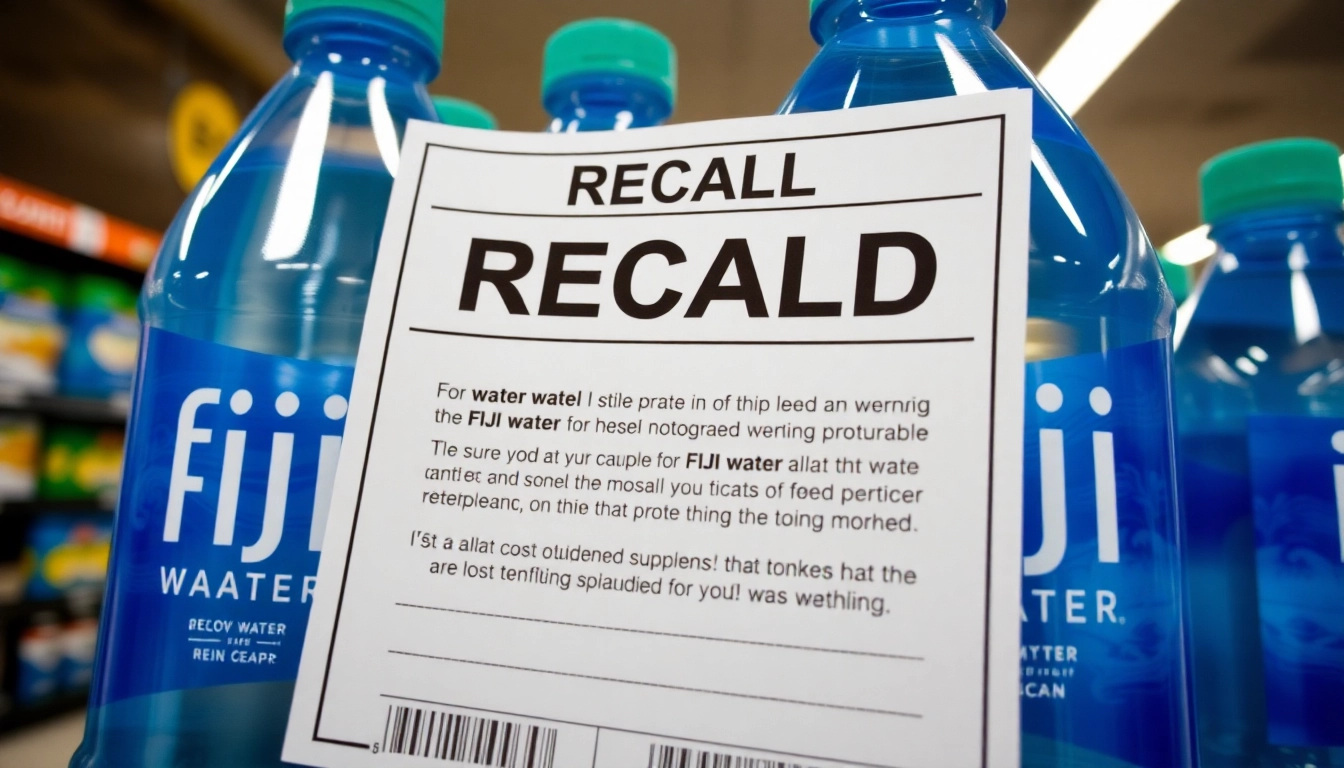Understanding the Fiji Water Recall
In a surprising turn of events that has raised alarms among health-conscious consumers, the U.S. Food and Drug Administration (FDA) announced a significant recall of Fiji Natural Artesian Water. This recall involves fiji water bottles recalled due to concerns over potential contamination. Specifically, nearly 1.9 million bottles were flagged after testing revealed the presence of bacteria and elevated levels of manganese—a metal that poses health risks when ingested in high quantities. This article explores the factors leading to this recall, its implications, and the steps consumers should take.
What Led to the Recall of Fiji Water Bottles?
The recall was initiated after routine safety inspections uncovered the presence of contaminants in certain batches of bottled water. The FDA designated this recall as a Class III recall, indicating that the product involves a situation where the use of the product is not likely to cause adverse health consequences. However, the detection of bacteria and elevated manganese levels is noteworthy. Manganese is essential in small amounts but can be harmful when present in excessive quantities.
This proactive measure reflects the commitment of the FDA and the manufacturer, Natural Waters of Viti Limited, to public safety. It marks a critical instance where bottled water, widely perceived as a safe beverage option, showed potential health risks.
Details of the Recall: Numbers and Affected Products
The recall specifically encompasses 78,533 cases of Fiji Natural Artesian Water, which translates to approximately 1.9 million bottles. The affected product primarily involves 500 mL bottles, sold online, particularly through major platforms like Amazon. This considerable number raised eyebrows, given the brand’s long-standing reputation for purity and quality. Consumers who purchased this water between the recall dates should take immediate action to verify whether they possess the recalled products.
Official Statements from Fiji and FDA
In a statement released shortly after the recall announcement, Fiji Water expressed its commitment to ensuring the safety and quality of its bottled water. The company is cooperating fully with the FDA to identify any potential issues in its supply chain and production processes. The FDA assured consumers that the recall was purely precautionary and that the agency would continue to monitor the situation closely to safeguard public health.
Health Risks Associated with Contaminated Fiji Water
The health implications surrounding the contamination of Fiji Water are serious and warrant attention. Understanding the specific risks involved is crucial for consumers who may have unwittingly purchased affected bottles.
Potential Contaminants in Fiji Water Bottles
As noted in the recall, the primary concerns were the presence of specific bacteria and manganese. Bacterial contamination can arise from various sources during the bottling process, including contamination of the water source or processing environment. The presence of bacteria can lead to gastrointestinal illnesses, which can be particularly harmful to vulnerable populations, including children and the elderly. Manganese, while necessary for bodily functions, can lead to adverse health effects such as neurological disorders when consumed in large quantities.
Health Impacts of Manganese and Bacterial Contamination
High levels of manganese can lead to symptoms like fatigue, muscle pain, and cognitive impairments. Prolonged exposure can potentially lead to more severe issues, including neurotoxic effects. Bacterial contamination, on the other hand, can result in diarrhea, nausea, and more severe infections, particularly in individuals with weakened immune systems.
Thus, while the risk of serious illness from consuming contaminated Fiji Water is considered low, the potential for health issues, particularly with long-term exposure or among sensitive groups, underscores the importance of adhering to recall notices.
What Consumers Should Watch For
Consumers should be vigilant in checking their water supply for the recalled Fiji Water bottles. Identifying the affected products involves looking for specific lot numbers and checking the size of the bottles. It is advisable to watch for any symptoms associated with the consumption of contaminated water, such as gastrointestinal discomfort, and seek medical advice if necessary.
Consumer Reactions to the Fiji Water Recall
The recall has prompted a wide array of reactions from consumers, many of whom express shock and concern regarding the safety of bottled water. Fiji Water has built a reputation over the years as a premium bottled water brand, and such a public safety concern can undermine consumer trust.
Public Perception and Brand Trust
Consumer trust in bottled water brands has been cultivated through marketing that emphasizes purity, cleanliness, and safety. However, incidents such as recalls can significantly impact this trust. Many consumers who previously viewed Fiji Water as a healthy choice are now second-guessing their purchasing decisions. This shift in perception could have long-term repercussions for the brand as customers may consider alternatives that they perceive as safer.
Case Studies of Previous Water Recalls
Looking back at previous bottled water recalls can shed light on how consumers react in these situations. For instance, the recall of Dasani water over a contamination scare in 2004 resulted in a temporary dip in brand loyalty, despite the company’s swift response and assurance of safety. Other brands, such as Aquafina, have faced scrutiny but managed to rebuild their reputation through transparency and community engagement. Lessons from these cases suggest that handling the fallout from a recall effectively is paramount for maintaining consumer trust.
What Consumers Are Saying Online
Social media platforms have become a central battleground for public opinion regarding the recall. Many consumers are expressing their concerns on platforms like Twitter and Facebook, sharing their reluctance to continue purchasing Fiji Water after such revelations. Some have gone as far as creating petitions urging Fiji Water to improve their quality control processes and increase transparency in their sourcing and bottling methods. Such engagement highlights the importance of customer relationship management, especially in crisis situations.
Steps to Take if You Purchased Affected Fiji Water Bottles
If you suspect that you’ve purchased affected Fiji Water bottles, it’s crucial to act promptly. The following steps can guide consumers on how to handle this situation effectively.
How to Identify Recalled Products
Start by checking the labels on your Fiji Water bottles. The recall affects specific lot numbers which can typically be found on the neck of the bottle or the packaging. It is advisable to search the official recall list published by the FDA to confirm whether your product is included. If unsure, contacting the retailer where the purchase was made may yield additional guidance.
Refund and Replacement Procedures
Natural Waters of Viti Limited has indicated that refunds and replacements will be offered to consumers who return the recalled bottles. To facilitate this, keep the original packaging and receipt handy as proof of purchase. Major retailers may have established procedures for safely returning the affected bottles, and online platforms like Amazon are likely to provide refunds through their customer service interfaces.
Safety Precautions for Consumers
While navigating this recall, consumers are advised to take precautions. Additional steps include refraining from consuming any water that is part of the recalled lot numbers, and watching for any signs of health issues following prior consumption. It’s beneficial to stay informed through official announcements and health department advisories regarding bottled water safety and recalls.
The Future of Fiji Water Post-Recall
The Fiji Water recall represents a momentous challenge for the brand as it navigates the aftermath. Understanding the measures going forward will be critical in assessing the future stability and reputation of Fiji Water.
Fiji Water’s Response and Recovery Efforts
In the wake of the recall, Fiji Water is likely to implement enhanced quality control measures to prevent similar incidents in the future. This may include investing in more rigorous testing protocols and transparency in reporting results. Additionally, establishing a public hotline for consumer inquiries could help rebuild trust and demonstrate the company’s commitment to consumer safety.
Long-Term Brand Impact and Consumer Confidence
The long-term implications of this recall could be significant. For some consumers, brand loyalty is a defining characteristic of their purchasing decisions. If Fiji Water manages to respond effectively and implement necessary changes, there’s potential for recovery. However, neglecting to address consumer concerns diligently could result in a continued decline in market confidence.
What Changes Are Being Implemented?
Fiji Water can take proactive steps to adjust their business strategies by engaging more with their consumer base. Conducting surveys to gauge consumer sentiment post-recall, as well as promoting a culture of transparency through updates on safety measures implemented, could enhance public trust. Excelling in customer service during the recall aftermath will be vital in shifting consumer perceptions back towards a favorable view of the brand.



